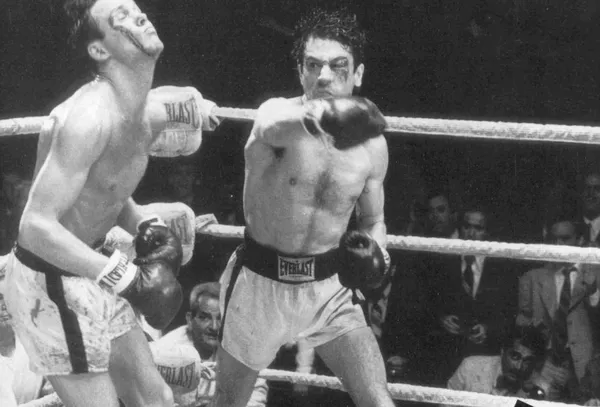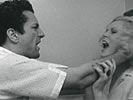Eye For Film >> Movies >> Raging Bull (1980) Film Review
Raging Bull
Reviewed by: Robert Munro

In the opening credits of Raging Bull a classic is born. Jake La Motta (Robert De Niro), captured by the stark nakedness of Michael Chapman’s black and white cinematography, prowls around an empty boxing ring. Pietro Mascagni’s searing yet melancholy operatic score provides the only accompaniment to La Motta’s solitude. It's a shot so beautifully and carefully composed that it seems to play somewhere in the background of the brain throughout the rest of the picture.
La Motta is a middleweight boxer, respected and feared for his ability to take an incredible amount of punishment rather than for any real pugilistic grace. He wants to win the title on his own terms, without any help from the underworld figures that populate his New York Bronx neighbourhood – figures Scorsese excels in depicting. His brother Joey, (Joe Pesci) acts as his manager, trying to negotiate La Motta’s rise to the top of the division – and several famous bouts with Sugar Ray Robinson – as well as La Motta’s fierce temper and self-destructive nature.

Pesci and De Niro – to be reunited ten years later in Martin Scorsese’s masterpiece of the Nineties Goodfellas – were surely born for these roles. De Niro’s renowned devotion to the art of acting has never been so tested. His portrayal of the paranoid, deeply troubled La Motta is burned indelibly into every scene. The intensity of it exhausts and terrifies the viewer in equal measure. It's a performance planed down from the Travis Bickle level of psychosis in Taxi Driver, yet this makes it all the more horrifying. De Niro’s silent stares, his ability to turn a grin into a sneer in a instant and that blinking incomprehension he does so well, all combine to make this a dark and troubling watch.
This is best delivered in the now infamous scenes in which La Motta struggles to fix the aerial on a new television in his home. Scorsese’s control of these scenes is masterly. The tension builds and dissipates as La Motta’s nerves and patience exist on the thinnest, most tightly wound of lines – one which will inevitably snap, and it is waiting for the snap that becomes almost unbearable.
As he’s fiddling with the aerial his wife Vickie (Cathy Moriarty) returns home. La Motta is unimpressed with her alibi – she’s been out shopping – his frustration with the aerial growing. His paranoia takes over, and he begins to question Joey about his wife. Joey tries to laugh it off at first, offering gentle digs about La Motta’s ballooning weight – which only serve to ramp the unease up another notch. A throwaway comment about La Motta’s paranoia sets something off in Jake’s troubled mind, and he begins to repeatedly ask Joey: "You fuck my wife?" Joey, insulted, refuses to answer and leaves. La Motta, in a terrifyingly calm manner, heads up the stairs to ask his wife the same question.
Fed up with his bullying and threatening behaviour Vickie goads him, saying she’s not only fucked Joey but everyone else on the street too. La Motta breaks a door and heads off down the street to his brother’s house, Vickie chasing after him throwing fists and insults as hard as she can. La Motta bursts into the house where Joey is eating dinner with his wife and kids, and savagely beats Joey in-front of them. Vicki tries to intervene and is knocked out with a punch that belonged in the ring. La Motta returns home to sit in the dark and watch the fuzzy screen of his broken television.
Scorsese, De Niro and screenwriter Paul Schrader explore familiar themes beneath the bludgeoning savagery of La Motta’s persona. Jake never accepts the love offered by his wife – it’s not so much that he’s the whoring misogynist type, but more that his crushing insecurities, hidden by those powerful fists, seem to constantly undermine any potential for happiness.
As ever in a Scorsese picture, there’s also huge amount of Catholic guilt and metaphorical emasculation bubbling away underneath it all. The day before a big fight Vickie cavorts temptingly with La Motta, yet he resists and cools himself off by pouring a bucket of iced water down his boxer shorts. Scorsese’s camerawork ensures we don’t miss the inherent symbolism of the aftermath of that fight – which La Motta lost - as his swollen hands are plunged into another bucket of iced water.
By the end of the film The Raging Bull of the title not only serves as La Motta’s ring moniker, suited to his ferocious fighting style, but also as metaphor for the man himself. Propelled by fear, jealousy and rage, plus other desires he can never quite articulate, La Motta blunders onwards with such devastating power and brutality as to leave nothing worth a damn in his wake.
Reviewed on: 24 Sep 2011

















